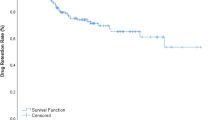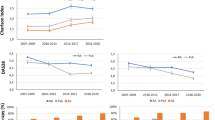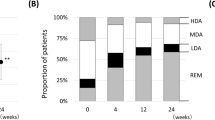Abstract
The unique genetic, environmental and medical backgrounds of people in Japan might influence the effectiveness and safety of biologic agents in patients with rheumatoid arthritis (RA). Indeed, clinical trials revealed higher response rates to some biologic agents (including infliximab, etanercept and tocilizumab) in patients with RA in Japan than patients treated with the same agents in Western countries, although response rates to adalimumab were comparable in both populations. The reasons why response rates to some biologic agents differ in Japanese individuals is currently under investigation. Post-marketing surveillance data have been collected for all patients with RA who were treated with biologic agents in Japan to monitor drug safety. These data clearly demonstrated that only ∼5% of these patients experienced adverse drug reactions to biologic agents, which were well tolerated. Pneumonia, tuberculosis, Pneumocystis jirovecii pneumonia and interstitial pneumonitis are considered important severe adverse reactions and risk factors for these adverse effects have been identified. Adverse drug reactions could exaggerate the risks associated with biologic therapy in Japanese patients with RA. Attempts have, therefore, been made to predict clinical response and adverse effects to enable personalized therapy with biologic agents and to optimize the outcomes of these patients.
Key Points
-
The effectiveness and safety of biologic agents in Japanese patients with rheumatoid arthritis (RA) could be influenced by the unique genetic, environmental and medical backgrounds of these individuals
-
Japanese patients with RA with highly active disease and rapid progression of structural joint damage have favorable clinical responses (including retardation of joint destruction) when treated with biologic agents
-
Post-marketing surveillance data for all patients with RA treated with biologic agents in Japan demonstrated a low incidence of adverse reactions (∼5%)
-
In Japanese patients, important adverse reactions to biologic agents include pneumonia, tuberculosis, Pneumocystis jirovecii pneumonia and interstitial pneumonitis
-
Identification of predictive markers could facilitate personalized therapy with biologic agents and optimize the outcomes of patients with RA
This is a preview of subscription content, access via your institution
Access options
Subscribe to this journal
Receive 12 print issues and online access
$209.00 per year
only $17.42 per issue
Buy this article
- Purchase on Springer Link
- Instant access to full article PDF
Prices may be subject to local taxes which are calculated during checkout



Similar content being viewed by others
References
Khan, M. A. HLA-B27 and its subtypes in world populations. Curr. Opin. Rheumatol. 7, 263–269 (1995).
Takeuchi, T. et al. Postmarketing surveillance of the safety profile of infliximab in 5,000 Japanese patients with rheumatoid arthritis. Ann. Rheum. Dis. 67, 189–194 (2008).
Health white paper [Japanese]. Japanese Ministry of Health [online], (2010).
Abe, T. et al. A multicenter, double-blind, randomized, placebo controlled trial of infliximab combined with low dose methotrexate in Japanese patients with rheumatoid arthritis. J. Rheumatol. 33, 37–44 (2006).
Koike, T. et al. Postmarketing surveillance of the safety and effectiveness of etanercept in Japan. J. Rheumatol. 36, 898–906 (2009).
Miyasaka, N. ; CHANGE Study Investigators. Clinical investigation in highly disease-affected rheumatoid arthritis patients in Japan with adalimumab applying standard and general evaluation: the CHANGE study. Mod. Rheumatol. 18, 252–262 (2008).
Sokka, T., Envalds, M. & Pincus, T. Treatment of rheumatoid arthritis: a global perspective on the use of antirheumatic drugs. Mod. Rheumatol. 18, 228–239 (2008).
Kameda, H. et al. Factors predicting response to a low-dose methotrexate therapy in patients with rheumatoid arthritis: A better response in male patients. Mod. Rheumtol 14, 442–446 (2004).
Smolen, J. S. et al. Treating rheumatoid arthritis to target: recommendations of an international task force. Ann. Rheum. Dis. 69, 631–637 (2010).
Visser, K. & van der Heijde, D. Optimal dosage and route of administration of methotrexate in rheumatoid arthritis: a systematic review of the literature. Ann. Rheum. Dis. 68, 1094–1099 (2009).
Sekiguchi, N., Kameda, H., Amano, K. & Takeuchi, T. Efficacy and safety of bucillamine, a D-penicillamine analogue, in patients with active rheumatoid arthritis. Mod. Rheumatol. 16, 85–91 (2006).
Ichikawa, Y. et al. Therapeutic effects of the combination of methotrexate and bucillamine in early rheumatoid arthritis: a multicenter, double-blind, randomized controlled study. Mod. Rheumatol. 15, 323–328 (2005).
Osiri, M, et al. Leflunomide for the treatment of rheumatoid arthritis: a systematic review and meta-analysis. J. Rheumatol. 30, 1182–1190 (2003).
Sawada, T. et al. Leflunomide-induced interstitial lung disease: prevalence and risk factors in Japanese patients with rheumatoid arthritis. Rheumatology (Oxford) 48, 1069–1072 (2009).
Sato, T. et al. Factors associated with fatal outcome of leflunomide-induced lung injury in Japanese patients with rheumatoid arthritis. Rheumatology (Oxford) 48, 1265–1268 (2009).
Safety information of leflunomide in Japan [Japanese]. Sanofi-Aventis [online], (2010).
Suzuki, K. et al. Single center prospective study of tacrolimus efficacy and safety in treatment of rheumatoid arthritis. Rheumatol. Int. 29, 431–436 (2009).
Takeuchi, T., Kawai, S., Yamamoto, K. & Miyasaka, N. Post-marketing surveillance of the safety and effectiveness of tacrolimus in 3,267 Japanese patients with rheumatoid arthritis. Ann. Rheum. Dis. 69 (Suppl. 3), 219 (2010).
Nishimoto, N. et al. Treatment of rheumatoid arthritis with humanized anti-interleukin-6 receptor antibody: a multicenter, double-blind, placebo-controlled trial. Arthritis Rheum. 50, 1761–1769 (2004).
Phase II dose-finding clinical trials for abatacept [Japanese]. Enbrel [online], (2010).
Takeuchi, T., Abe, T., Yamamoto, A. & Miyasaka, N. New biologics for rheumatoid arthritis in Japan; A multi-center randomized double-blind, controlled, dose-response study of abatacept (BMS-188667) in Japanese active rheumatoid arthritis (RA) patients with an inadequate response to methotrexate. Mod. Rheumatol. 19, S32 (2009).
Takeuchi, T., Miyasaka, N., Inoue, K., Abe, T. & Koike, T. Impact of trough serum level on radiographic and clinical response to infliximab plus methotrexate in patients with rheumatoid arthritis: results from the RISING study. Mod. Rheumatol. 19, 478–487 (2009).
Kameda, H. et al. Etanercept (ETN) with methotrexate (MTX) is better than ETN monotherapy in patients with active rheumatoid arthritis despite MTX therapy: A randomized trial. Mod. Rheum. doi: 10.1007/s10165-010-0324-4.
Yamanaka, H. et al. Retrospective clinical study on the notable efficacy and related factors of infliximab therapy in a rheumatoid arthritis management group in Japan (RECONFIRM). Mod. Rheumatol. 17, 28–32 (2007).
Tanaka, Y. et al. Retrospective clinical study on the notable efficacy and related factors of infliximab therapy in a rheumatoid arthritis management group in Japan: One-year clinical and radiographic outcomes (RECONFIRM-II). Mod. Rheumatol. 18, 146–152 (2008).
Takeuchi, T. et al. Retrospective clinical study on the notable efficacy and related factors of infliximab therapy in a rheumatoid arthritis management group in Japan: one-year outcome of joint destruction (RECONFIRM-2J). Mod. Rheumatol. 18, 447–454 (2008).
Lipsky, P. E. et al. Infliximab and methotrexate in the treatment of rheumatoid arthritis. Anti-Tumor Necrosis Factor Trial in Rheumatoid Arthritis with Concomitant Therapy Study Group. N. Engl. J. Med. 343, 1594–1602 (2000).
Kameda, H. et al. Etanercept (ETN) plus methotrexate (MTX) combination therapy resulted in a better outcome in joint damage and physical function than ETN monotherapy even in patients with active rheumatoid arthritis despite MTX treatment: 52-week results from the JESMR study. Ann. Rheum. Dis. 68 (Suppl. 3), 121 (2009).
Kawai, S. et al. Comparability of etanercept pharmacokinetics in healthy Japanese and American subjects. J. Clin. Pharmacol. 46, 418–423 (2006).
van de Putte, L. B. et al. Efficacy and safety of adalimumab as monotherapy in patients with rheumatoid arthritis for whom previous disease modifying antirheumatic drug treatment has failed. Ann. Rheum. Dis. 63, 508–516 (2004).
Nishimoto, N. et al. Study of active controlled tocilizumab monotherapy for rheumatoid arthritis patients with an inadequate response to methotrexate (SATORI): significant reduction in disease activity and serum vascular endothelial growth factor by IL-6 receptor inhibition therapy. Mod. Rheumatol. 19, 12–19 (2009).
Nishimoto, N. et al. Study of active controlled monotherapy used for rheumatoid arthritis, an IL-6 inhibitor (SAMURAI): evidence of clinical and radiographic benefit from an x ray reader-blinded randomised controlled trial of tocilizumab. Ann. Rheum. Dis. 66, 1162–1167 (2007).
Nishimoto, N. et al. Long-term safety and efficacy of tocilizumab, an anti-IL-6 receptor monoclonal antibody, in monotherapy, in patients with rheumatoid arthritis (the STREAM study): evidence of safety and efficacy in a 5-year extension study. Ann. Rheum. Dis. 68, 1580–1584 (2009).
Yamanaka, H. et al. Efficacy of tocilizumab in rheumatoid arthritis patients with daily clinical practice in Japan: Results from a retorspective study (REACTION). Ann. Rheum. Dis. 69 (Suppl. 3), 547 (2010).
Miyasaka, N., Takeuchi, T. & Eguchi, K. Proposed [corrected] Japanese guidelines for the use of infliximab for rheumatoid arthritis. Mod. Rheumatol. 15, 4–8 (2005).
Miyasaka, N., Takeuchi, T. & Eguchi, K. Guidelines for the proper use of etanercept in Japan. Mod. Rheumatol. 16, 63–67 (2006).
Koike, R., Takeuchi, T., Eguchi, K. & Miyasaka, N. Update on the Japanese guidelines for the use of infliximab and etanercept in rheumatoid arthritis. Mod. Rheumatol. 17, 451–458 (2007).
Koike, R. et al. Japan College of Rheumatology 2009 guidelines for the use of tocilizumab, a humanized anti-interleukin-6 receptor monoclonal antibody, in rheumatoid arthritis. Mod. Rheumatol. 19, 351–357 (2009).
Guidelines for adalimumab [Japanese]. Japan College of Rheumatology [online], (2008).
Keane, J. et al. Tuberculosis associated with infliximab, a tumor necrosis factor alpha-neutralizing agent. N. Engl. J. Med. 345, 1098–1104 (2001).
Arthritis advisory committee. Safety Update on TNF-α antagonists: infliximab and etanercept. FDA [online], (2001).
Komano, Y. et al. Pneumocystis jiroveci pneumonia in patients with rheumatoid arthritis treated with infliximab: a retrospective review and case-control study of 21 patients. Arthritis Rheum. 61, 305–312 (2009).
Tokuda, H. et al. Clinical and radiological features of Pneumocystis pneumonia in patients with rheumatoid arthritis, in comparison with methotrexate pneumonitis and Pneumocystis pneumonia in acquired immunodeficiency syndrome: a multicenter study. Intern. Med. 47, 915–923 (2008).
Saijo, S. et al. Dectin-1 is required for host defense against Pneumocystis carinii but not against Candida albicans. Nat. Immunol. 8, 39–46 (2007).
Steele, C. et al. Alveolar macrophage-mediated killing of Pneumocystis carinii f. sp. muris involves molecular recognition by the Dectin-1 β-glucan receptor. J. Exp. Med. 198, 1677–1688 (2003).
Hahn, P. Y. et al. Pneumocystis carinii cell wall β-glucan induces release of macrophage inflammatory protein-2 from alveolar epithelial cells via a lactosylceramide-mediated mechanism. J. Biol. Chem. 278, 2043–2050 (2003).
Tasaka, S. et al. Serum indicators for the diagnosis of pneumocystis pneumonia. Chest 131, 1173–1180 (2007).
Ohosone, Y. et al. Clinical characteristics of patients with rheumatoid arthritis and methotrexate induced pneumonitis. J. Rheumatol. 24, 2299–2303 (1997).
Shidara, K. et al. Incidence of and risk factors for interstitial pneumonia in patients with rheumatoid arthritis in a large Japanese observational cohort, IORRA. Mod. Rheumatol. 20, 280–286 (2010).
Kameda, H. & Takeuchi, T. Recent advances in the treatment of interstitial lung disease in patients with polymyositis/dermatomyositis. Endocr. Metab. Immune Disord. Drug Targets 6, 409–415 (2006).
Azuma, A., Hagiwara, K. & Kudoh, S. Basis of acute exacerbation of idiopathic pulmonary fibrosis in Japanese patients. Am. J. Respir. Crit. Care Med. 177, 1397–1398 (2008).
Kudoh, S. et al. Interstitial lung disease in Japanese patients with lung cancer: a cohort and nested case-control study. Am. J. Respir. Crit. Care Med. 177, 1348–1357 (2008).
Abe, T. & Takeuchi, T. The other side of TNF-targeted therapy of patients with rheumatoid arthritis. Curr. Rheumatol. Rep. 3, 1–2 (2001).
Quinn, M. A. et al. Very early treatment with infliximab in addition to methotrexate in early, poor-prognosis rheumatoid arthritis reduces magnetic resonance imaging evidence of synovitis and damage, with sustained benefit after infliximab withdrawal: results from a twelve-month randomized, double-blind, placebo-controlled trial. Arthritis Rheum. 52, 27–35 (2005).
van der Kooij, S. M. et al. Drug-free remission, functioning and radiographic damage after 4 years of response-driven treatment in patients with recent-onset rheumatoid arthritis. Ann. Rheum. Dis. 68, 914–921 (2009).
Tanaka, Y. et al. Discontinuation of infliximab after attaining low disease activity in patients with rheumatoid arthritis: RRR (remission induction by Remicade in RA) study. Ann. Rheum. Dis. 69, 1286–1291 (2010).
Radovits, B. J. et al. Influence of age on the outcome of antitumour necrosis factor alpha therapy in rheumatoid arthritis. Ann. Rheum. Dis. 68, 1470–1473 (2009).
Tutuncu, Z. et al. Fcgamma receptor type IIIA polymorphisms influence treatment outcomes in patients with inflammatory arthritis treated with tumor necrosis factor alpha-blocking agents. Arthritis Rheum. 52, 2693–2696 (2005).
Canete, J. D. et al. Influence of variants of Fcγ receptors IIA and IIIA on the American College of Rheumatology and European League Against Rheumatism responses to anti-tumour necrosis factor α therapy in rheumatoid arthritis. Ann. Rheum. Dis. 68, 1547–1552 (2009).
Sekiguchi, N. et al. Messenger ribonucleic acid expression profile in peripheral blood cells from RA patients following treatment with an anti-TNF-α monoclonal antibody, infliximab. Rheumatology (Oxford) 47, 780–788 (2008).
Tanino, M. et al. Prediction of efficacy of anti-TNF biologic agent, infliximab, for rheumatoid arthritis patients using a comprehensive transcriptome analysis of white blood cells. Biochem. Biophys. Res. Commun. 387, 261–265 (2009).
Sugihara, M. et al. Effects of infliximab therapy on gene expression levels of tumor necrosis factor α, tristetraprolin, T cell intracellular antigen 1, and Hu antigen R. in patients with rheumatoid arthritis. Arthritis Rheum. 56, 2160–2169 (2007).
Tsuzaka, K., Itami, Y., Takeuchi, T., Shinozaki, N. & Morishita, T. ADAMTS5 is a biomarker for prediction of the response to infliximab in patients with rheumatoid arthritis. J. Rheumatol. 37, 1454–1460 (2010).
Kastbom, A. et al. Fcγ receptor type IIIA genotype and response to tumor necrosis factor α-blocking agents in patients with rheumatoid arthritis. Arthritis Rheum. 56, 448–452 (2007).
Pavy, S. et al. Tumour necrosis factorα −308G->A polymorphism is not associated with response to TNFα blockers in Caucasian patients with rheumatoid arthritis: systematic review and meta-analysis. Ann. Rheum. Dis. 69, 1022–1028 (2010).
Hughes, L. B. et al. Genetic risk factors for infection in patients with early rheumatoid arthritis. Genes Immun. 5, 641–647 (2004).
Author information
Authors and Affiliations
Contributions
Both authors contributed equally to all aspects of this manuscript.
Corresponding author
Ethics declarations
Competing interests
T. Takeuchi has received honoraria from Abbott, Bristol-Myers-Squibb, Chugai Pharmaceutical, Eisai Pharmaceuticals, Janssen Pharmaceutica, Mitsubishi Tanabe Pharma, Novartis, Takeda Pharmaceuticals and Wyeth Japan and research grants from Chugai Pharmaceutical, Eisai Pharmaceuticals, Mitsubishi Tanabe Pharma, Takeda Pharmaceuticals and Wyeth Japan. H. Kameda has received honoraria from Abbott, Centocor Ortho Biotech, Chugai Pharmaceutical, Eisai Pharmaceuticals, Mitsubishi Tanabe Pharma, Takeda Pharmaceuticals and Wyeth Japan.
Rights and permissions
About this article
Cite this article
Takeuchi, T., Kameda, H. The Japanese experience with biologic therapies for rheumatoid arthritis. Nat Rev Rheumatol 6, 644–652 (2010). https://doi.org/10.1038/nrrheum.2010.154
Published:
Issue Date:
DOI: https://doi.org/10.1038/nrrheum.2010.154
This article is cited by
-
25 years of biologic DMARDs in rheumatology
Nature Reviews Rheumatology (2023)
-
Pneumocystosis in a patient with rheumatoid arthritis on adalimumab therapy: a case-based review
Rheumatology International (2023)
-
Cytokines and cytokine receptors as targets of immune-mediated inflammatory diseases—RA as a role model
Inflammation and Regeneration (2022)
-
Serum level of IFNβ distinguishes early from late relapses after biologics withdrawal in rheumatoid arthritis
Scientific Reports (2022)
-
A novel multi-biomarker combination predicting relapse from long-term remission after discontinuation of biological drugs in rheumatoid arthritis
Scientific Reports (2021)



